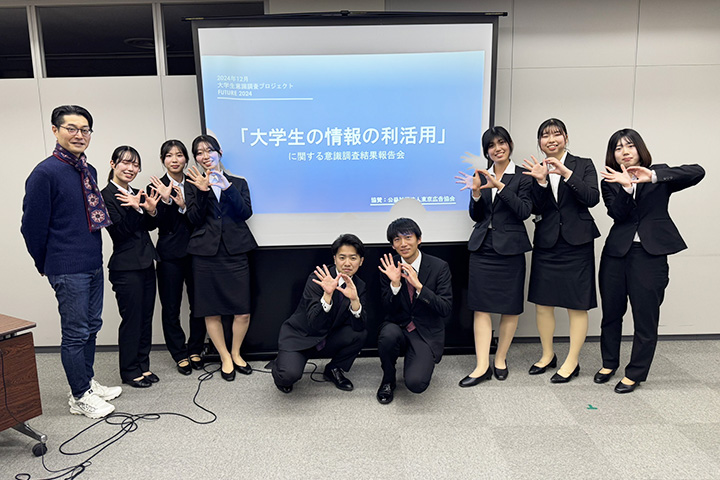The "University Student Awareness Survey Project (FUTURE2024)", in which eight students from Faculty of Service Innovation participated, held a press conference on December 9, 2024 to announce the results of a survey on "University Student Awareness of Utilizing Information."
The "University Student Awareness Survey Project" is conducted with the aim of students learning about advertising and marketing research in a practical way, and is conducted with the participation of volunteer university students studying in advertising and marketing seminars under the guidance and support of the organizer, the Tokyo Advertising Association, a public interest incorporated association. This is a long-running project that has been ongoing since 1995, and since its inception, students have been in charge of the entire process of planning, conducting, and analyzing the survey.
The 2024 project was formed in April by 28 students from our university, Aoyama Gakuin University, Edogawa University, Komazawa University, and Senshu University. The eight students from our university are studying marketing and communication in a seminar taught by Professor Daigo Matsumoto Faculty of Service Innovation.
The theme of this survey was "Changes in behavior and awareness regarding 'information utilization by university students.'" We conducted a questionnaire survey of 1,000 people to find out how today's university students, who have grown up with digital media on a daily basis since childhood, interact with information, what they are conscious of when disseminating information, and how they deal with and utilize generative AI, which has recently emerged. We also analyzed the responses.
The survey revealed that approximately 60% of university students use interactive generative AI, and approximately 80% actively use it for "study support." It also revealed that they are making efforts to rationally and efficiently collect information from various digital media and to identify high-quality information. It also revealed that in text-based communication, students engage in dialogue to accurately grasp the other person's intentions and goals, and then verify their own hypotheses before deriving the optimal solution, a process that goes through the cycle.
[Participating students]
Faculty of Service Innovation 3rd year
Yuki Ishigami (graduated from Kashima Gakuen High School)
Mizuki Ito (graduated from Ina High School)
Kosuke Kawa (graduated from Hoshino High School)
Misuzu Sato (from Mobara High School)
Kanami Sugawara (graduated from Miyagino High School)
Arisa Hirama (graduated from Katsuta High School)
Rinka Horiguchi (graduated from Tsuruoka Kita High School)
Kokoro Yamanishi (graduated from Mishima Minami High School)
I participated because I was attracted to the idea of learning with students from other universities and being taught practical matters by people from advertising companies. In this project, we set the theme, asked questions in the survey, coded the results, and then considered facts, interpretations, and assertions. In particular, I struggled to grasp the "distance of thinking" when it came to "considering interpretations from facts," because if the interpretation is too far-fetched, it becomes too far removed from the facts. I am grateful to have had the opportunity to meet the members I studied with over the course of eight months, and to have been able to think about and learn how to apply the idea in practice with the guidance of people from advertising companies.
Kanami Sugawara
